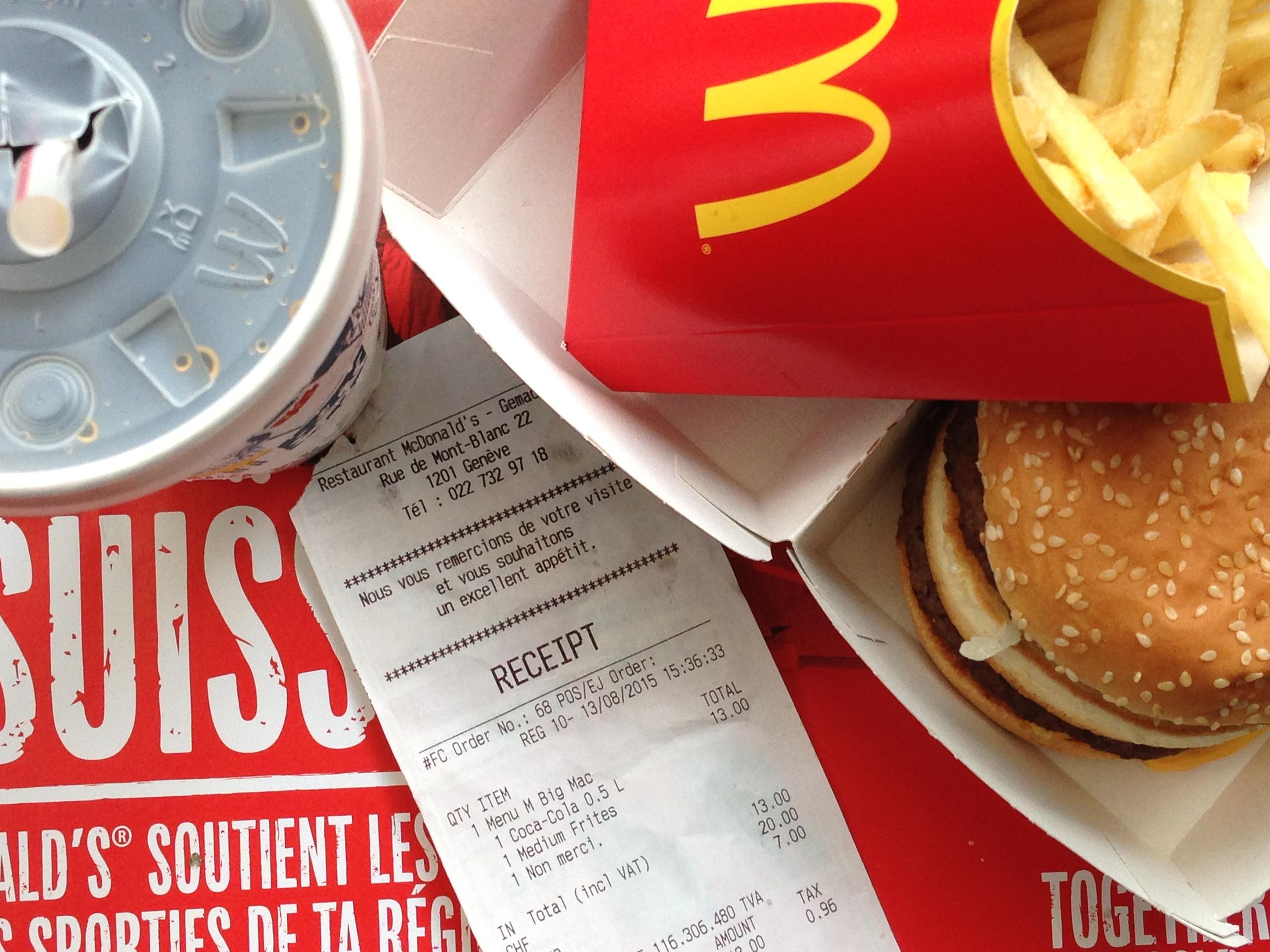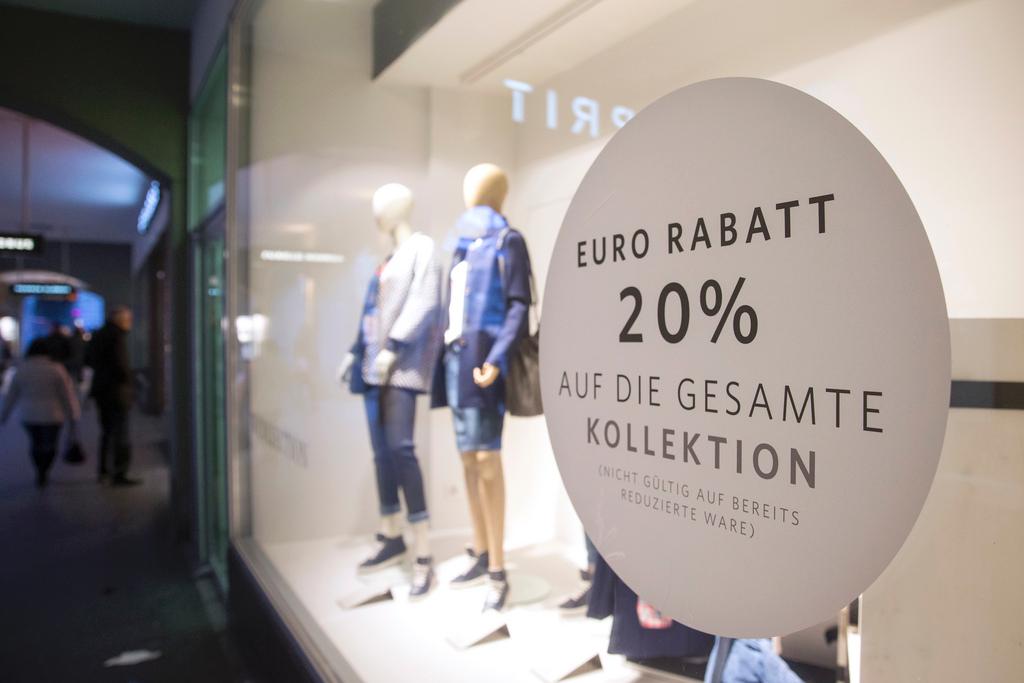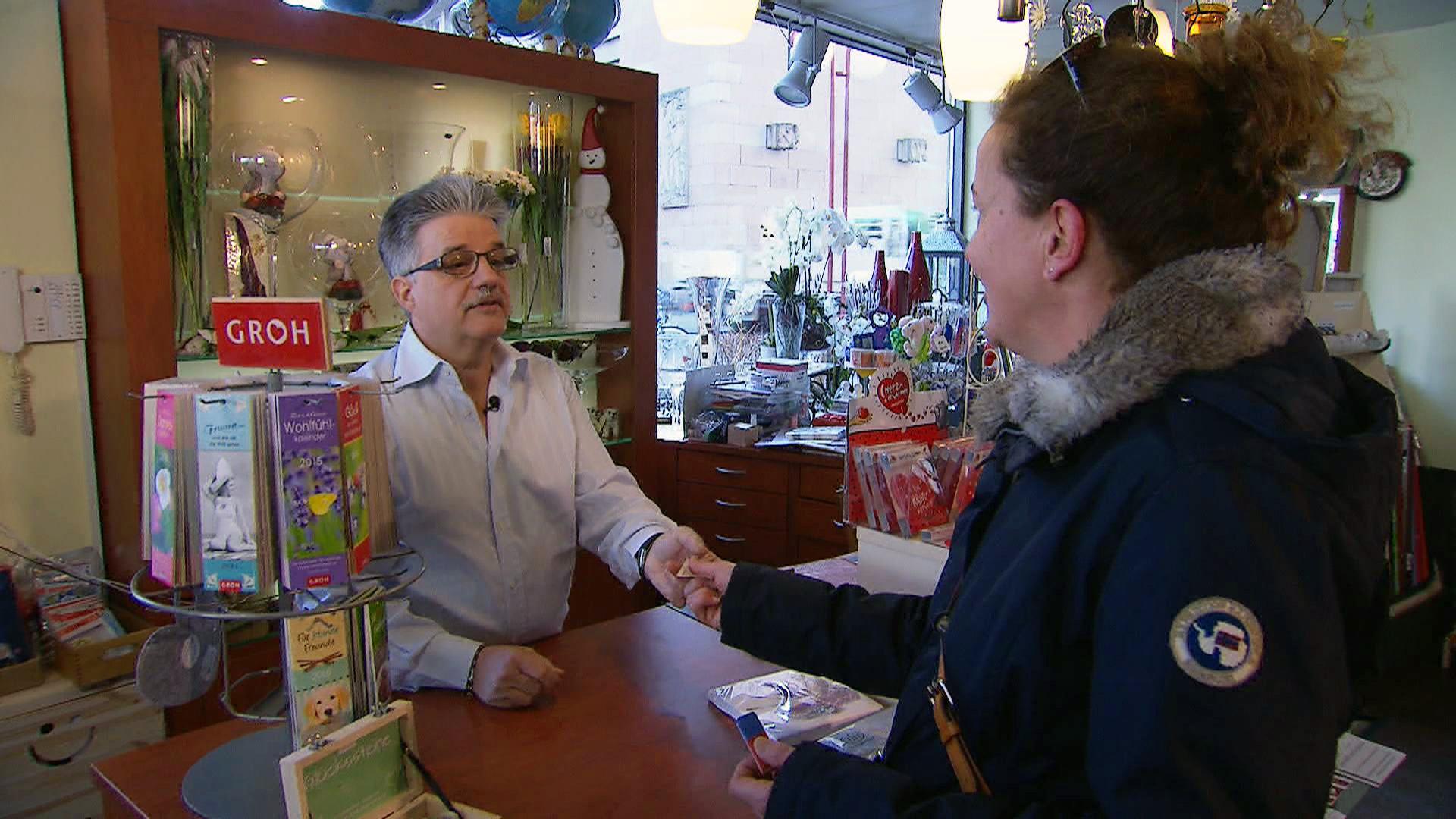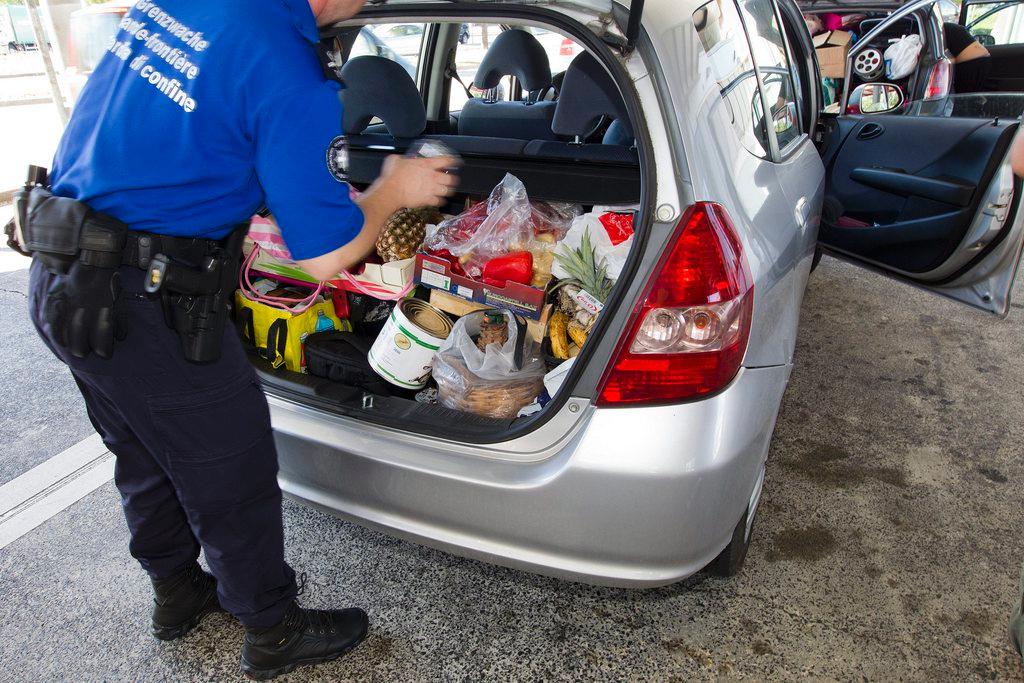Strong franc eats away at consumer confidence

Switzerland is the most expensive country in Europe, according to a recent price comparison – and the world, if we are just talking about Big Macs. swissinfo.ch reports from Geneva on what consumers – locals and foreigners – make of the strong franc and the sky-high prices.
When I bump into Matt and his family outside the McCafé on the Rue du Mont-Blanc in central Geneva, they are still digesting their meal – and the prices: a Big Mac, large coke and fries cost CHF13 ($13.30).
“We just came across the border from France for a day trip. I haven’t been to Geneva for 25 years. I knew Geneva was one of the most expensive places in the world but it really surprised me. It’s a lot,” said the British holidaymaker.
Switzerland tops The Economist’s latest Big Mac Index, published on July 18. This light-hearted burger benchmark, which measures purchasing-power-parity or the value of a currency, suggests that the franc remains massively overvalued – and Swiss burgers are by far the priciest.
The small alpine nation already had a reputation for being a high-price island in the middle of Europe, but on January 15 when the Swiss National Bank (SNB) abruptly removed its cap on the franc – set at CHF1.20 per euro – it sent the franc soaring.
This has exaggerated the already sizeable price differences between Switzerland and the rest of Europe (see graphic lower down for price comparisons) and put huge pressure on Swiss businesses, especially retailers.
With more francs in their pockets, price-conscious shoppers in Switzerland have flocked to neighbouring countries to stock up on eurozone goods that are around 30% cheaper in many cases.
Cross-border savings
At the Praz du Léman shopping centre at Annemasse in neighbouring France, just a short hop over the border in southeast Geneva, queues of cars – around one in four with Swiss number plates – back up to the main road waiting for parking spaces.
Tim drove to the huge Casino supermarket from Geneva to buy fish, meat, diapers and other items for his young family. He says he has no qualms about regularly shopping in France and saves around 40% on his monthly groceries bill compared to Switzerland.
“Even though the prices of certain items have come down a little bit in Switzerland [since January], the majority are still much cheaper in France,” he explained. “When you buy the same diapers in Switzerland and they are twice the price, you do feel like you are getting ripped off as it’s the same manufacturer.”
Swiss retailers say cross-border shopping cost them around CHF13 billion in lost revenue in 2014 and this figure is set to increase in 2015. The weekend traffic jams have not let up since January.
“Extensive reductions”
The research consultancy BAKBasel predicts retail turnover in Switzerland to fall by 2.1% this year compared with 2014 – the steepest decline in retail sales in 35 years – as internal demand wanes due to a rise in cross-border shopping, fewer tourists and the general economic slowdown.
The big domestic retailers have tried to fight back through special offers. But higher fixed costs for salaries and rent reduce how far they can pass on lower prices from the elimination of the exchange rate peg while keeping their profit margins.
Supermarket giants Coop and Migros say they have negotiated hard with eurozone suppliers to reduce the prices of thousands of items on their shelves since January. Coop spokesman Ramon Gander said “extensive reductions” on over 14,000 products are worth CHF170 million.
There is evidence that consumer prices have been falling slightly. On August 5, the Federal Statistical Office said prices had dropped 1.3% from July 2014, a year-on-year slow reduction for ninth months in a row, highlighting deflationary pressure. BAKBasel predicts further price reductions to kick in over the coming months and the SNB has said it expects prices to fall this year and in 2016.
So what do consumers make of it all? Have they noticed lower prices in Switzerland?
“Absolutely not,” said Barbara, an elderly woman outside a Migros supermarket in Geneva’s central Paquis district. “At the start a few things went down, but that’s over.”
Her comments echoed those of many other shoppers questioned in Geneva, who felt prices had changed very little since January.
Earning higher salaries (see infobox), the Swiss arguably have fewer price worries than many other Europeans and the overvalued franc has potentially made them richer if they shop or travel in Europe.
“I haven’t changed my habits as a consumer but it’s easier to go on holiday,” said Sylvan, a trainee architect. “CHF300 is now about €300. It’s much easier to spend without looking at the price.”
Consumer confidence
But according to a fresh survey in August by the State Secretariat for Economic Affairs (Seco), Switzerland’s long-term economic situation, unemployment and the high cost of living seem to be eating away at consumer confidence, which is nearing a four-year low.
Those surviving on low incomes – such as old age pensioners, students and migrants – who perhaps cannot go shopping in France have little room for manoeuvre.
“I don’t have a car,” said an elderly shopper outside Migros in Geneva. “I’m one of the victims of the high prices.”
For the middle classes, food, health insurance, rent and transport represent a sizeable chunk of the monthly budget. When compulsory deductions are taken away and the high cost of living is factored in, there is not a lot left at the end of the month.
Most Swiss seem to have resigned themselves to the removal of the franc-euro cap and living with the overvalued currency, however. In a recent SonntagsZeitung-Tages-Anzeiger poll, three-quarters of those questioned were against reintroducing a cap to maintain the franc back at CHF1.20 to the euro.
Several shoppers in Geneva said they did not mind paying a little more for what they viewed as higher Swiss quality in order to support the economy.
“I’m careful and buy local produce to help the regional economy so I avoid as much as possible going shopping in France,” said Hélène, a young Paquis resident.
But many of those questioned still criticized what they said were unreasonably high prices.
“I’ve travelled to many countries and in Switzerland they bang on about the quality. Some things are much better quality but do they deserve such high prices? I don’t think it so. When you travel to other parts of the world the quality is just as good as in Switzerland and prices are cheaper. It’s a myth that they have done in promoting and elevating the prices but I don’t think a lot of the high prices are justified,” said Tim.
High wages
According to recent figures published by the Geneva Statistics Office in January 2015, the median monthly gross salary in 2012 in the private sector in canton Geneva stood at CHF7,042. This compares with a Swiss median salary of CHF6,118. In ten years, the median salary has risen by 13% in Switzerland and 16% in canton Geneva.
In the public sector median gross monthly salaries in 2012 were even higher: CHF8,666 in canton Geneva, CHF7,490 in neighbouring canton Vaud, and CHF7,750 on average in Switzerland.
In France, the median monthly net salary in 2012 stood at €1,730.
Strong franc impact
In a recent interview with Bloomberg, Switzerland’s economy minister Johann Schneider- Ammann said the strength of the Swiss franc, which is weighing on exports and prices, was a challenge for the country.
The State Secretariat for Economic Affairs (Seco) says gross domestic product should expand 0.8% this year, accelerating to 1.6% in 2016. Unemployment is set to rise to 3.5% next year from 3.3% at the end of this year, according to its most recent forecast, issued in June.
On January 15, 2015, the Swiss franc fell from its peg of CHF1.20 to the euro, to around parity over the following months. Schneider-Ammann said he hoped the currency would weaken to 1.10 per euro in the coming days or weeks. The franc was trading at 1.079 per euro on August 27.

In compliance with the JTI standards
More: SWI swissinfo.ch certified by the Journalism Trust Initiative













You can find an overview of ongoing debates with our journalists here . Please join us!
If you want to start a conversation about a topic raised in this article or want to report factual errors, email us at english@swissinfo.ch.